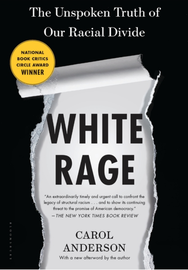A WRITER'S WIT |
My Book World

Unspoken Truth of Our Racial
Divide. New York: Bloomsbury,
2016.
Unspoken indeed. Professor Anderson takes readers through the long yet decisive history of White Rage. It is a history that has lain directly beneath the noses of all Americans but one that has been covered up, ignored, or outright distorted, as well. Anderson revives for readers the five primary events in US history which incite and keep alive White Rage.
First, following the Civil War, former Confederates refuse actually to take Reconstruction seriously, and the North ignores the South’s refusal. Two, as a direct result of this action, freed African-Americans migrate north, only to find they are no more welcome there than they have been in the South. In places, rejection is even more hostile, more vitriolic. Three, White Rage is incited with the Brown vs. Topeka decision to integrate American schools, and at least two decades are spent in fighting or rolling back provisions of this decision—making most school districts as segregated as they ever were. Four, the author delineates how Ronald Reagan’s white-rage leadership reverses, insidiously, the Civil Rights gains of the 1960s and 1970s. And last, Anderson reiterates what contemporary readers have witnessed for themselves, how the election of an African-American president, Barack Obama, once again incites White Rage, a backlash that results in the questionable election of Donald Trump.
Anderson’s book reinforces the recent writings of other black authors, Ta-Nehisi Coates, for one. She doesn’t mention reparations, but my thinking is that our country will never be at rest, can never truly hold its head up among nations until it has, in more than a symbolic manner, attempted to make reparations to the descendants of slavery. It won’t be difficult to determine who qualifies. The government will be able to use the same visible trait it used to discriminate, and that is the color of one’s skin. Anyone with African-American lineage should qualify for funding for free education, help with daily living expenses until one is independent. Not only that, but the trillions of dollars that were accrued by this nation during slavery off the backs of black men and women, should be multiplied to, in some manner, make it up to our dark-skinned brethren. Their ancestors were captured on their native soil, mauled, maligned—treated more harshly than work animals—and the surviving generations of victims of White Rage deserve recompense. The one percent will have to pay their fair share to ensure that this happens, along with the rest of us, but it must be done. And it must be done with an amount of good will and love. The fires of White Rage must be quelled forever. Only then can our nation heal.
NEXT TIME: My Journey of States-34 Kentucky



 RSS Feed
RSS Feed